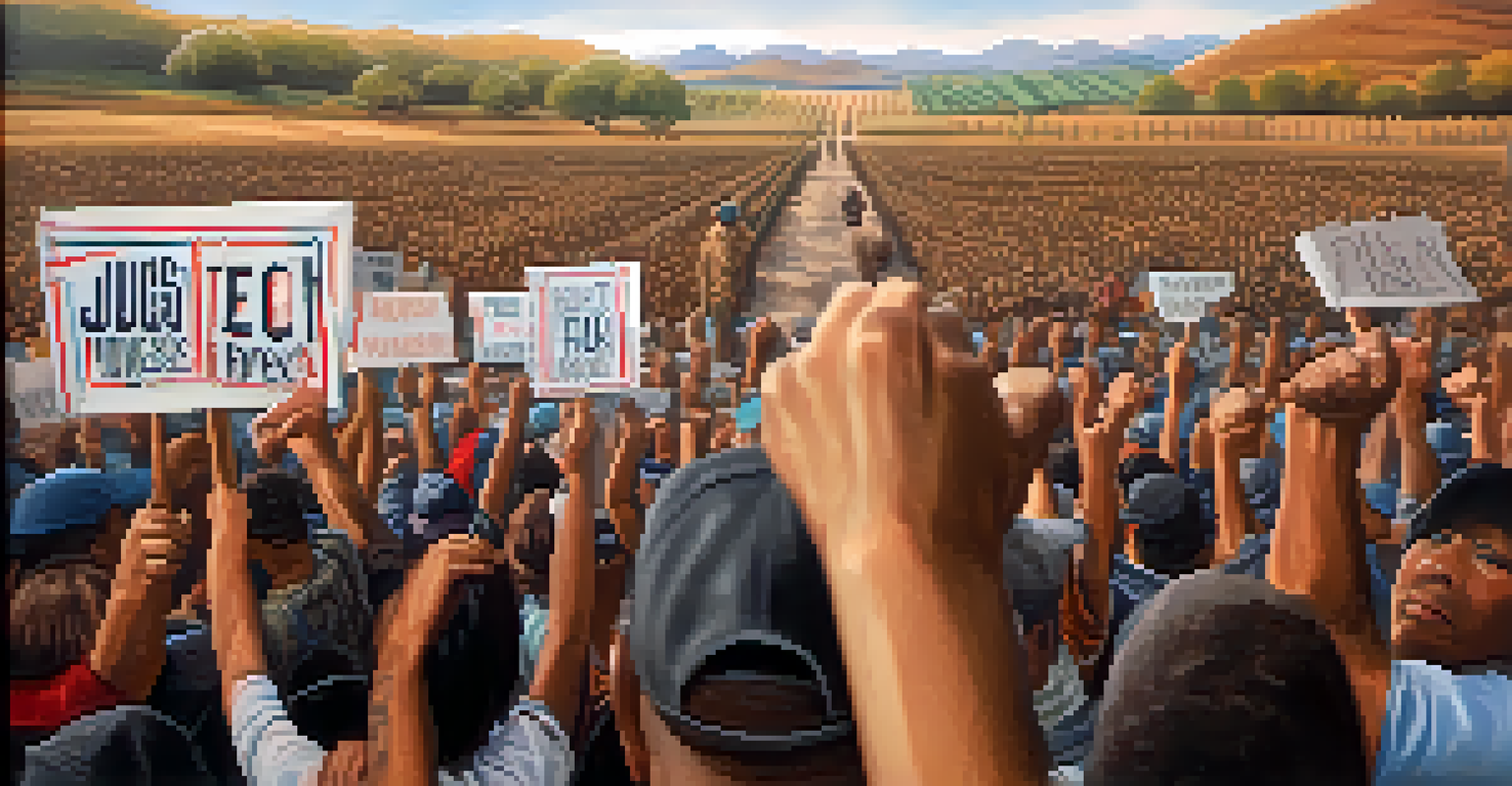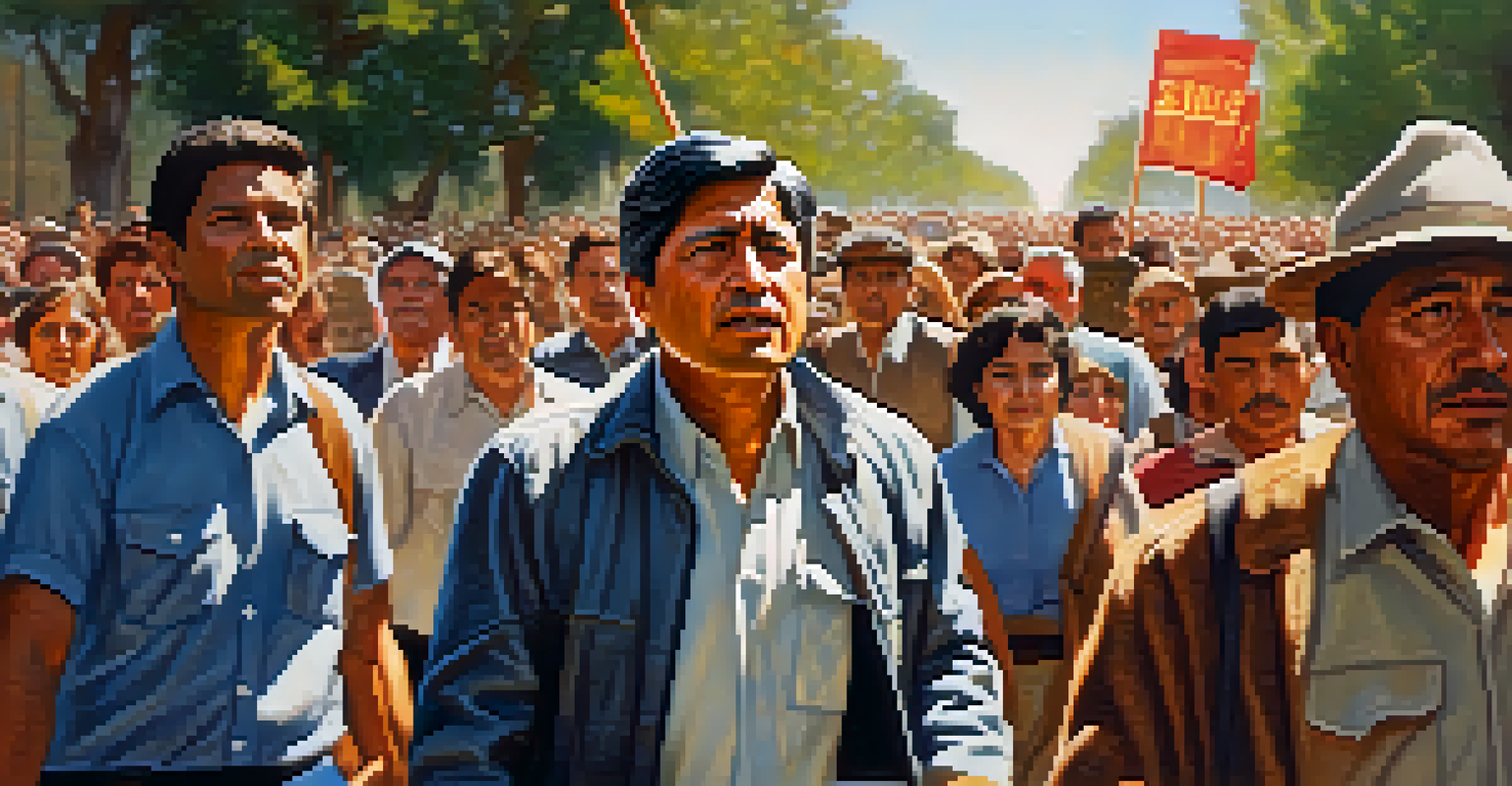Cesar Chavez: Champion of Labor Rights in California

Early Life and Influences on Chavez's Activism
Cesar Chavez was born on March 31, 1927, in Yuma, Arizona, to a Mexican-American family. His early experiences as a migrant farmworker deeply shaped his understanding of labor struggles. After his family lost their farm during the Great Depression, they traveled across California for work, giving Chavez firsthand insight into the hardships faced by workers.
The fight is never about grapes or lettuce. It’s always about people.
These formative years instilled in him a profound sense of injustice and a desire to advocate for those who were often overlooked. Chavez's commitment to civil rights was also influenced by figures like Mahatma Gandhi and Martin Luther King Jr., who emphasized nonviolent resistance. This blend of personal experiences and inspirational figures laid the groundwork for his future activism.
Ultimately, Chavez's early life experiences fueled his passion for labor rights, setting the stage for his significant contributions to the United Farm Workers (UFW) and the broader labor movement.
Founding the United Farm Workers Union
In 1962, Chavez co-founded the United Farm Workers Union, aiming to improve conditions for farm laborers. This was a monumental step, as farmworkers were often subjected to poor wages, long hours, and unsafe conditions. The UFW sought to unify workers under a single banner to give them a stronger voice in negotiations with employers.

Chavez believed that collective action was the key to achieving labor rights. He organized strikes and boycotts, most famously the Delano grape strike in 1965, which lasted for five years. This movement not only drew national attention but also mobilized support from consumers and other labor organizations, amplifying the call for justice.
Chavez's Early Life Shaped Activism
Cesar Chavez's upbringing as a migrant farmworker instilled in him a passion for labor rights and social justice.
Through the UFW, Chavez championed the rights of farmworkers, demonstrating the power of solidarity in advocating for change.
The Impact of Nonviolent Protest
Chavez's philosophy of nonviolence was central to his approach in advocating for labor rights. He organized peaceful protests, marches, and hunger strikes to draw attention to the plight of farmworkers. One of his most notable actions was a 25-day hunger strike in 1968, which underscored his commitment to the cause and garnered significant media coverage.
We cannot seek achievement for ourselves and forget about progress and prosperity for our community. Our ambitions must be broad enough to include the aspirations and needs of others, for their sakes and for our own.
By using nonviolent methods, Chavez aimed to appeal to the conscience of the public and promote empathy for workers' struggles. His approach led to increased awareness about the conditions faced by farmworkers and inspired many to join the movement. This strategy proved effective in galvanizing public support and pressuring companies to improve labor conditions.
Chavez's legacy of nonviolent protest continues to influence social justice movements today, showing that peaceful action can lead to significant change.
Legislation and Achievements in Labor Rights
Through relentless advocacy, Chavez and the UFW achieved several important victories for labor rights in California. One of the most significant was the California Agricultural Labor Relations Act of 1975, which established the right of farmworkers to organize and bargain collectively. This landmark legislation was a direct result of the pressures exerted by Chavez and his supporters.
Chavez's efforts also led to improved working conditions, wage increases, and health benefits for many farmworkers. The UFW negotiated contracts with several major agricultural companies, setting standards that would benefit workers for years to come. These achievements not only improved the lives of individual workers but also inspired other labor movements across the nation.
Nonviolent Protest Achieved Change
Chavez's commitment to nonviolent methods, such as strikes and hunger strikes, effectively raised awareness and garnered public support for farmworkers' rights.
Ultimately, Chavez's work laid the foundation for future labor rights advancements, showcasing the importance of organized labor in advocating for social justice.
Cesar Chavez Day and His Enduring Legacy
Cesar Chavez's impact on labor rights is commemorated every year on Cesar Chavez Day, celebrated on March 31. This day serves as a reminder of his contributions and the ongoing struggle for workers' rights. Schools, organizations, and communities honor his legacy through events, educational programs, and community service activities.
His influence extends beyond California, inspiring activists and labor leaders across the United States and around the world. Chavez's commitment to social justice resonates with many, particularly those advocating for marginalized communities. His teachings about the power of unity and nonviolent protest continue to inspire new generations of activists.
In celebrating Cesar Chavez, we acknowledge not only his achievements but also the ongoing fight for labor rights that remains relevant today.
Challenges Faced by Chavez and the UFW
Despite the successes, Cesar Chavez and the UFW faced numerous challenges throughout their journey. Opponents, including agribusiness leaders and some law enforcement agencies, actively resisted their efforts. The struggle for labor rights was often met with hostility, and Chavez endured threats and intimidation as he advocated for change.
Internal disputes within the UFW also posed challenges, as differing opinions on strategy and leadership emerged. These conflicts sometimes undermined the movement's effectiveness and created divisions among supporters. Nevertheless, Chavez remained steadfast in his commitment, learning from setbacks and adapting his strategies as needed.
Legacy of Labor Rights Advocacy
Cesar Chavez's efforts established significant labor rights protections and continue to inspire movements for social justice today.
Chavez's resilience in the face of adversity only strengthened his resolve, exemplifying the tenacity required to fight for social justice.
Cesar Chavez's Influence on Future Movements
Cesar Chavez's legacy extends far beyond his lifetime, influencing numerous social and labor movements. His emphasis on grassroots organizing and community engagement has become a model for various causes, including immigrant rights and environmental justice. Activists today continue to draw inspiration from Chavez's methods and principles.
Organizations like the UFW continue to advocate for farmworkers, carrying forward Chavez's vision of dignity and respect for all workers. His life story serves as a powerful reminder of the impact that one individual can have on a larger movement. The principles of solidarity and nonviolent resistance remain central to many contemporary movements.

Chavez's influence is a testament to the enduring power of advocacy, demonstrating that the fight for labor rights is ongoing and requires collective action.
Conclusion: Cesar Chavez's Lasting Impact
Cesar Chavez's contributions to labor rights in California and beyond are immeasurable. His unwavering dedication to improving the lives of farmworkers and advocating for social justice has left a lasting legacy. Today, his work is recognized as a pivotal chapter in the history of labor movements in the United States.
Chavez's story reminds us of the importance of standing up for workers' rights and the impact of collective action. As we reflect on his life and achievements, we are encouraged to continue fighting for justice and equality for all workers. His legacy serves as a call to action, urging us to remember the ongoing struggles faced by many in the workforce.
In honoring Cesar Chavez, we not only celebrate his achievements but also commit ourselves to the ongoing pursuit of equity and justice in labor rights.